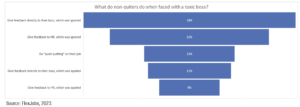Googling “toxic bosses” brings up 14,600,000 results in 0.29 seconds. Clearly, the topic generates much prose without even touching on the business issues such bosses cause.
It’s a truism: employees don’t leave bad jobs—they leave bad bosses. The cost alone of the toxic boss (which I will now refer to as “TB,” since managerial toxicity crosses genders) is substantial; the effect on the organization is even more significant.
Industry analyst Josh Bersin outlines the cost in terms of employee replacement: hiring and onboarding costs, lost productivity from both the empty seat and the new hire‘s learning curve, likelihood of customer service errors, and lost training expense. However, there is more: the morale cost to the organization, lost productivity, adverse cultural impact, loss of company knowledge, and the potential of a chain reaction in employee departures. In addition, there is the personal and familial cost to the employee, often leading to health or emotional issues. Further, corporate reputation can easily suffer with the ease of widespread information sharing about the work environment.
I suspect that TBs do not recognize or take ownership of their toxicity and its effect on their teams. Likewise, the toxic manager may seem an ideal employee to their own manager. The belittled, bullied worker suffers—and HR may not realize the extent of the problem until key players leave or team attrition runs high. Furthermore, when an HR professional is aware of the issue, what steps can be taken to alleviate it – indeed, are there any, and how likely is it for HR to step in?
How Bad Can They Be?
According to Flexjobs, nearly 9 out of 10 employees have suffered a TB. Overall, 87% of professionals say they have been under the tutelage of a toxic manager, and 30% have had this experience with more than one manager. Their bosses often are so sure of their own decisions that they would never admit to being wrong, take suggestions from others, or certainly not accept criticism from a subordinate. Often, they are selective in their victims—reserving hypercritical and belittlement for certain employees, making snide remarks about them, and picking on them in front of other teammates, for example. The result is that the toxic boss cannot be trusted, which is readily apparent to both the targeted employee and the rest of the team members: If the boss picks on this person so mercilessly, what prevents me from being the next victim?
In my mentoring capacity, I have worked with many individuals who have faced the negative effects of toxic managers at work. Several resign, most get updated resumes out in the market, some try to wait it out and keep their heads down, and some try desperately to make the boss like them and cease the bullying (the latter strategy has not proved successful).
Of those who didn’t outright quit, some did the following to deal with their situation, finds FlexJobs (Nearly 9 in 10 workers have had toxic managers | HRD America (hcamag.com)): https://bit.ly/3IQKiTM.

Source: FlexJobs, 2023.
Let’s Hear from You
I plan on writing future columns on coping with a toxic work environment and what HR’s responsibility should be. I would love to hear from you if you have experiences to share—and especially any solutions you tried that worked! I can be reached at Katherine_ICS@MSN.com.




